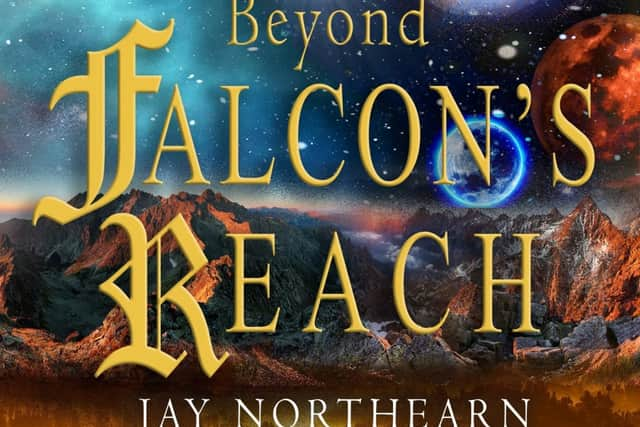This Week’s Must Read: Beyond Falcon’s Reach by Jay Northearn


This article contains affiliate links. We may earn a small commission on items purchased through this article, but that does not affect our editorial judgement.
Winter is coming - but not soon enough. Ahead of next month’s long-awaited TV finale of Game of Thrones, George RR Martin fans can get their fix with a new fantasy fiction novel that packs enough violence, politics and bloodlust to fill each of the Seven Kingdoms of Westeros, finds Lucy Bryson.
After well over a year of speculative agony, Winter is almost over. When HBO’s season 8 finale of Game of Thrones (GoT) finally airs on April 15, it is set to become one of the biggest moments in TV history. Reports suggest that 25.1million viewers tuned into its sixth season alone, excluding millions more who watched it illegally through online torrents.
But GoT’s phenomenal success should come as no surprise given its creator’s commitment to storytelling. George RR Martin reportedly had no ‘eureka moment’ but rather took years to conceptualise his A Song of Ice and Fire novels fully. The fruits of his labour now generate a reported personal income of about US$15million annually from the TV series and another US$10million from his literary works.
Thanks to visionaries like Martin and his predecessors – Tolkien and C. S. Lewis among them – fantasy fiction made the unthinkable leap from niche genre to mass mainstream consumption. Today, that market continues to surge as increasing numbers of high-quality books hit the real and digital bookshelves.
Among them is Beyond Falcon’s Reach, a novel I received last week and which I devoured in a single sitting. Like those great works before it, Jay Northearn’s debut novel is wonderfully original fantasy fiction. Drawing on British and European medieval history, the story is set in a mythical world divided by religion and social standing. It is grounded in a dark version of reality where deep-rooted superstitions have created an ancient and bloody rift between ‘Landfolk’ and ‘Mountain-People’. At the centre of the action is Tianna Fell, the beautiful, empowered daughter of monied landowner, Kaylan – the Landmaster of Dartingvale. When Tianna is abducted by the mountain dweller, Mourde Cullis, who plans to extract her blood and her life essence, Kaylan sets out to return her to safety.
Northearn’s book is epic in tone and cinematic in scope. And, much like GoT, it’s also gritty (and, in places, not for the faint-hearted). His villain, Mourde Cullis, is brilliant, original and memorable. Cullis has a bloodlust like no other and has developed a torturous blood-sucking machine, the ‘Autom’, with the aim to extract a mythical blood-based elixir called the ‘Immaculate Condensive’ from living Landfolk. Tianna is far from the first of the landfolk to suffer the excruciating pain of the Autom, but she is the first to deliver some of the fabled elixir for Cullis and which promises to bestow upon him greatly-improved strength and stamina, as well as a lengthy lifespan. His experiments, however, come at a high cost when he learns that madness and monstrous manifestations are among the side-effects of his illicit blood harvest.


Much of the book feels politically relevant. After a period of scientific ‘reasonism’, a malignant cult has embraced cultural fears brought on by a dramatic climate change and a threat to world resources, to manipulate peoples’ fears for their own power-hungry ends.
What makes Beyond Falcon’s Reach so good – and to some degree so unique - is its genre-blending mix of epic fantasy, steampunk and off-beat vampire fiction. Whilst these ingredients work well singularly, a combination of one or more is in my experience hard to swallow and even more difficult to digest. Not here, though: Northearn’s sharp storytelling and eye for detail shines through from the outset. He’s successfully translated defining ages and empires into a mythical world of Viking-esque Shaigoth, Lockean ‘Reasonists’ and horse-riding adventurers who will stop at nothing to protect themselves and their loved ones. He creates a monstrous cast of characters intent on ill-doing, as well as handsome heroes and beautiful heroines. Tianna is a fabulous protagonist, and no slouch with a sword, who reminds me of GoT’s Arya Stark. She’ll need those fighting skills, and those of her allies, as for as long as there is a thirst for Immaculate Condensive, her life will constantly be in danger. As the book’s non-stop action races towards a somewhat grisly conclusion, the scene looks set for a next chapter: it can’t be game over for Tianna...can it?
The book deals with some real-world issues around religion, class and race (albeit transplanted into a fictional universe) and takes some very dark turns. But it’s also imbued with a Great British wit. Banter between the characters is, at times, laugh-out-loud funny, with the protagonists throwing out some nifty insults, even when staring death in the face. Many of the swear words and slang terms are recognisably British English, which may help it to stand out in a sea of US-based fantasy films, books and TV.
Character descriptions, meanwhile, are vivid and written with a healthy dose of wickedly dark (gallows) humour and with a delightful sense of the tongue-in-cheek absurd. Take this early encounter between Veskin, a one-armed poacher (with quite the backstory as to how he came to lose a limb) and Linden, a rich young man who claims to be on a Grand Tour of the lands:
“Still gettin' nowhere, lad. Just say what comes into yer head.”
“That's hard for me Veskin!”
“Think what it's like where I'm standin'!”
The book’s madcap brilliance and Northearn’s impeccable eye for scene-setting detail no doubt lie in the author’s background as a video games artist. Between the late nineties and early noughties he worked on concept design for popular strategy games such as Fragile Allegiance – a game still talked about in hushed tones among gamers more than 20 years after its creation – before translating his latent literary skills to the page. (Northearn is on record stating that Beyond Falcon’s Reach is a form of literary “revenge” for a labour-of-love gaming project that was abandoned by its producers, the now defunct Gremlin Interactive, at the last minute for financial reasons). [You can find out more about Northearn in the Meet the Author and Q&A, below – Ed].
Readers of medieval fantasy fiction – and of GoT, specifically - will delight in Northearn’s debut, which is the first in a planned trilogy. But so too will fans of vampire fiction. It’s much to the author’s credit that he’s dispensed with over-used tropes associated with the vampire genre - the stakes through the heart, coffins and vampire bats, to name just a few - to present bloodsuckers in a new and compelling way and breathing new life into a timelessly popular concept.
Verdict: A fantastical, gripping and thoroughly deserving debut.
Beyond Falcon’s Reach by Jay Northearn (Nuff Said Publishing) is out now on Amazon UK priced £14.25 in paperback and £2.26 in Kindle Edition. For more information, visit Jay Northearn’s official Facebook page.


Meet the Author: Jay Northearn
The British author Jay Northearn’s debut novel, Beyond Falcon’s Reach, is out now. Here’s everything we know about one of Britain’s rising fantasy authors…
Jay Northearn knows a thing or two about creating tales of adventure on an epic scale. From 1995 to 2002, he worked in the computer games industry as a digital artist and counts Fragile Allegiance, the space-strategy asteroid mining game released by Gremlin Interactive in the mid-90s; Galaga Destination Earth for the PlayStation; and Soldier of Fortune for Dreamcast amongst his many credits.
“I worked on a few other projects which never made it to publication, which is one of the most frustrating things about the fast-moving games industry,” he says. “Huge amounts of time and creativity were binned overnight if the project wasn’t predicted to be sufficiently profitable.”
Northearn, 51, made the effortless sidestep into fantasy fiction after a fantasy-orientated game of warring factions, called Tribal Lore, suffered the same fate. The game was based loosely on peoples of the ancient world and was set for international release in the late ‘90s. “All seemed well, then wham – out of nowhere the publisher pulled the plug and the project, and all my work, was forever consigned to the slush pile. I was later told it was a financial decision made by people far removed from studio development,” he explains. “It was the straw that broke the camel’s back.”


Perhaps unsurprisingly, his first novel, Beyond Falcon’s Reach, was published recently through US-based indie press Nuff Said Publishing to widespread acclaim. Its publication is, Northearn admits, his “sweet revenge” on an industry that did him no favours. “It’s my own small way of putting two fingers up at a system that bled me and others dry,” he adds.
The 330-page novel (reviewed above), which “demanded to be an epic”, started life as “scribbled meanderings” on a free sharing writing website called Booksie. The feedback he received from the site and its visitors was the “shot of nitroglycerin” he needed to complete his debut masterpiece and find a publisher.
“I’ve tried to create the kind of book I’d want to read myself, but writing is about communication”, Northearn says. “If others respond well to my efforts, then all that bizarre stuff in my head resonates with some others. I am not alone!”
Northearn lives and writes in the home in Market Harborough, Leicestershire, that he shares with wife, Julia. The pair met at the Liverpool Institute of Higher Education (now Liverpool Hope University) where Northearn obtained a degree in Art and English.
He now splits his time between writing new material, playing guitar – he’s “no Eric Clapton but can whack out a tune” - and as a residential support worker for adults with brain injuries and learning disabilities, a role he obtained in the aftermath of a serious road accident that left Julia fighting for life.
“I’m a creative at heart,” he says, “which means I’m happiest when I’m working.”
Exclusive Q&A with Jay Northearn
We sit down with the Beyond Falcon’s Reach author Jay Northearn, and his US publisher Nuff Said Publishing, to find out more about his inspiration and plans for the future.
Q: Beyond Falcon’s Reach paints a vivid picture of another world, with its own societies and lore that are both unique and familiar at the same time. Where did you draw inspiration for your book?
Jay Northearn (JN): As far as the unique yet familiar aspect is concerned, it’s an approach found in a number of books and films that have inspired me. For example, one of the great visual pulls of the Star Wars saga, especially when it first hit the big screen, was the dusty, oily realism of the ships, robots and the general technological atmosphere that audiences hadn’t really seen before in sci-fi. So much of this we owe to the late Ralph McQuarrie’s concept designs. Everything looks well-used, built with serviceable-looking parts, often battered - to the point of Han Solo having to thump the dashboard to kick-start the Millennium Falcon. How much more real can you get in sci-fi? Not much.
Aside from the purely visual, I like a grounded approach in cultural and historic terms. Read Frank Herbert’s Dune saga and you could be reading an account of how economic powers on our own planet vie for dominance over oil reserves, except that in the Dune galaxy it’s ‘spice’ at the heart of the power struggle. I love Tolkien, but there’s no magic ring at stake. It’s a finite resource - an issue all too familiar in today’s world.
As I worked on Beyond Falcon’s Reach, I was intent on creating a vampire mythos whilst avoiding the trappings of high fantasy. That is: no wizards casting lightning bolts and glowing runes. There’s nothing wrong with high fantasy, but I just didn’t want that for this story. In so doing, I realised that the vampires should follow suite, therefore deconstructed in a new context and on another world - almost explainable in an anthropological way. Mirrors work fine. Garlic is no problem, and, as the story is set in a culture without Christianity, there are no crucifixes to contend with. Even if my vampires were challenged with a hulking gold cross, they’d just ask what it is! Having said that, some traits endure: long life-span, extraordinary physical prowess, need for blood, and, yes, an irritating cultural snobbery. Similarly, there are magic users in the story, but they are shamanistic and bound to natural forces. It’s a kind of parallel world with intriguing nuances, rather like a Planet of the Apes what-if alternative reality.
Q: You shared the early chapters of what was to become Beyond Falcon’s Reach on online publishing site Booksie.com. What did you take most from this experience as an author, and how did you deal with any negative feedback?
JN: Booksie was instrumental, because Beyond Falcon’s Reach gained front-end featured status not long after uploading the first chapter. This unexpected promotion caused a sudden spike in readership, the work got some great comments, and this gave motivation to continue. It’s hard to operate in a vacuum, and Booksie solved that problem. There are other writing share-sites such as Wattpad, and for anyone starting a book of any kind, I can’t recommend writers share-sites highly enough for global feedback. Honestly, it’s gold-dust! The opinions of closest friends and family are, sadly, not to be counted on too much - either because they don’t want to hurt your feelings (if they don’t like what you’ve written) or they’re just not interested. Opinions from strangers can be more objective and valuable. It’s not all roses when negative comments come through, or some readers have lost interest, but that’s life. I’ve tried to take on board what seems meaningful and accept that you can’t please everyone.
Q: Your novel is a sprawling work of epic fantasy. With a full-time job, how did you manage to find the time and space to write?
JN: Finding time is very hard. Authors dream of writing full time … emphasis on dream because this is speculative fiction in itself for most! To fit writing Beyond Falcon’s Reach with work and daily responsibilities, I had to exploit the early mornings, often starting at 5am when there are no distractions. I also think the brain is more charged-up at that time. Solitude is important for concentration, so I have a laser-fence and missile system installed around my writing zone … well, not really … just a ‘do not disturb’ vibe around me, seldom encountered in the wee hours, thankfully.
Q: What is it about speculative fiction, and fantasy fiction in particular, that you find so compelling?
JN: Even in my middle-age, this world terrifies me, in the sense that life is so heavy on everyone, and people can be so heavy on each other. It only takes a perfect storm of illness, bereavement, job redundancy, whatever, and bang! You’re sleeping rough. It’s true that speculative fiction is a kind of escape (isn’t all fiction?) but it offers some rationale to all the pressures, the angst, the rapidly changing technologies we’re facing. When you see you’re just a speck in a much bigger scenario - created from immense forces from the past and those looming in the future, so much outside your control - you can go a little easier on yourself, aside from environmental responsibilities. You’re only human, so you might as well draw some entertainment from it.
The reason I’m drawn to fantasy fiction stems from the same thrill I get visiting ancient ruins, or even wondering around the British Museum: that numinous sense of being part of a much bigger story. All the struggles, achievements and dramas of the past shape our world today; not just the physical, but the way we think. With Christianity, for example, its impact on western democracy, beliefs and society has been colossal; more than many would like to admit. Speaking for myself, when visiting an early Christian site, in Greece for example, I find it amazing to think how people so long ago put things into motion which influence the culture I live in. For me, fantasy is about collective expanse combined with individual imagination. The freedom of the author is in how that is conveyed, and what manner of world to sub-create. As a European, my vision for Beyond Falcon’s Reach has a European flavour, but it’s great to see more writers from different cultures using the fantasy genre to re-interpret their own histories and mythologies. I think this is an area where science fiction and fantasy meet: both genres make us feel big and small at the same time.
Q: There’s a definite Game of Thrones vibe to your writing, in its gritty and realistic tone. Was the TV series an inspiration, and were there any other forms of popular entertainment outside of the literary world that helped inspire you?
JN: I haven’t followed every episode of GoT, but I’ve really enjoyed what I’ve seen. The effects are dazzling, the characterisation, screenplay … everything is a knock-out. It’s raised TV fantasy to a level we couldn’t imagine twenty years ago. The giants, for example, are believable giants; just large enough without their musculoskeletal systems collapsing under gravity. It is a fantasy world, but disturbingly Machiavellian. Look no further than the House of Medici and their rival clans of the renaissance. GoT bears the reality of human greed and power-play at its heart, and the really clever aspect is how it’s all convincingly transplanted into a fantasy landscape.
Music is also a big influence for me, and I dabble to this day with a Roland workstation keyboard. It takes up obscenely large room-space, and equal headspace to figure out how the thing works! I like evocative music with layers and textures - music that flares up the imagination. In this respect, ‘Beyond Falcon’s Reach’ was first inspired by a song from Peter Murphy (ex-frontman of the post-punk group Bauhaus). There’s a particular song on his ‘Ninth’ album called ‘The Prince and Old Lady Shade’ which blew me away with its fascinating lyrics, and its landscape of light and shade. Abstract glimpses from the music struck imaginative sparks, which eventually, somehow, formed the beginnings of a gothic-inspired story. It is strange how inspiration comes from different angles, and not necessarily other books.
Q: You’re now in your early 50s. Why did you to come late to writing fiction, and do you think it has given you any particular advantages over younger first-time authors?
JN: People should write at any age, as soon as the urge takes them. I don’t think there’s any ideal life-period or blueprint. For me, the desire to write has been a cumulative thing resulting from a lifetime enjoying books, art, film, music, whatever. I have tried fiction- writing a few times in the past, but it was familiar story of fading fire and not seeing it through. As I have got older, my concentration has actually improved. It takes disciplined focus to write a full-length novel, with nobody setting deadlines for you. These days, I appreciate that things will only happen because you make them happen. Nobody else will do it for you.
Older writers may often have advantages in more secure life situations and, therefore, more time to write - whereas a lot of younger people today are struggling to get jobs, education and put roofs over their heads, let alone write! It’s a disgrace, to be honest - a total slap in the face to the coming generations. Having said that, if you really want to be creative, no matter how that manifests, you’ll make time somehow.


Q: You come from a background in the British computer games industry, where you worked as a digital artist. How did you find your experiences in this field useful in writing your novel?